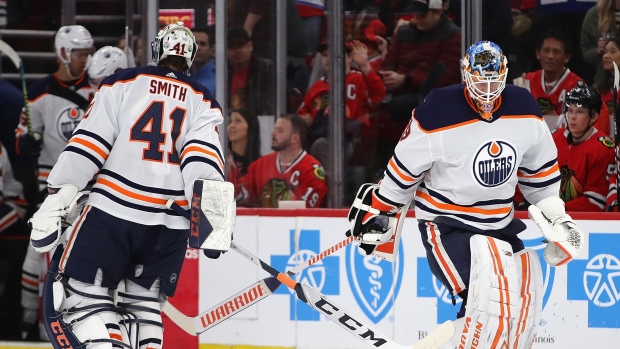Dec 23, 2020
Condensed schedule comes at a dangerous time for Oilers
Eleven sets of back-to-back games are sure to ramp up the pressure on an Edmonton goaltending duo that was already under the microscope, Travis Yost writes.
By Travis Yost

That is the number of back-to-back games on the 2020-21 regular-season schedule for the Edmonton Oilers released on Wednesday, a number exceeded by only the San Jose Sharks out in the Pacific Division.
The Oilers, like most teams, were prepared for a high percentage of back-to-back games through a compressed National Hockey League schedule. But it is of particular interest to an Edmonton team that knows its core weakness is on the defensive side of the ice, and in particular between the pipes.
A high percentage of back-to-back games will put an increased burden on the Oilers’ goaltending tandem – a burden that isn’t exactly shared equally across the league. The New York Rangers, as one example, will play just six sets of back-to-back games this season:
On one hand, the Oilers are a victim of circumstance. The closing of the U.S.-Canadian border, a highly compressed 56-game slate, and a degree of scheduling inflexibility the league hasn’t seen before created a difficult situation for all 31 franchises. But it comes at a dangerous time for the Oilers.
Compressed by the salary cap and with limited backup options available, the Oilers decided to run their goaltending tandem back for another season. Last year, Mikko Koskinen (.917 save percentage in 38 games) and Mike Smith (.902 save percentage in 39 games) were good enough to get the Oilers into the playoffs, but their performance – Smith’s in particular – predictably eroded over the second half of the season.
Making matters worse, Edmonton’s goaltending duo was abysmal in their qualifying-round loss to the Chicago Blackhawks. Oilers goalies stopped just 87.2 per cent of shots in the series, and gave up five goals more than expected based on the quality of shots faced.
If head coach Dave Tippett was hoping that the 38-year-old Smith would take a back seat this season – well, that’s no longer the case. Teams across the National Hockey League have opted to balance starters in back-to-back situations for years now, partially motivated by a desire to keep starting goaltenders fresh and healthy, and partially motivated by compelling data-driven arguments about performance degradation observed in goalies when forced to play two games in 24 hours. (Oh, and goaltender prospect Olivier Rodrigue will be spending this year playing overseas, so other internal options are quite limited.)
At any rate, it is safe to say that the pressure has been dialled up for an Edmonton goaltending duo that was already going to be under the microscope. Should they get off to a rocky start, expect general manager Ken Holland to be aggressive on the trade market.
A number of veteran goaltenders – including Tuukka Rask, Pekka Rinne, Antti Raanta, Devan Dubnyk, and James Reimer – see their contracts expire at the end of the year, and depending on how their respective regular seasons play out, may be available come the trade deadline.
Data via NHL.com and Hockey Reference

